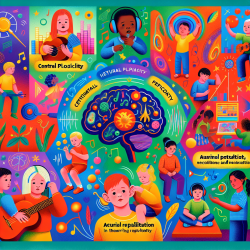In the realm of pediatric rehabilitation, the importance of data-driven decisions cannot be overstated. A recent study titled Perceptions and behaviors of healthcare providers towards rehabilitation support to children with severe malaria-related disability in Ethiopia: A qualitative descriptive study using the Theoretical Domains Framework sheds light on critical areas for improvement among healthcare providers. This research is not just a collection of observations; it is a blueprint for actionable change aimed at improving outcomes for children with severe malaria-related disabilities.
Severe malaria can have devastating long-term impacts on children, including neurocognitive impairments, mental health issues, and developmental delays. The study utilized the Theoretical Domains Framework (TDF) to explore the perceptions and behaviors of healthcare providers in Ethiopia, revealing several key areas that need attention. Here are the main findings and how they can be implemented to enhance practitioner skills and child outcomes:
- Knowledge and Skills: The study found a significant gap in knowledge and skills among healthcare providers regarding severe malaria-related disabilities. Practitioners should seek out specialized training programs that focus on the long-term impacts of severe malaria and effective rehabilitation techniques. Institutions should incorporate these topics into both pre-service and in-service training curricula.
- Beliefs About Consequences: Healthcare providers acknowledged the severe long-term consequences of malaria but often lacked the follow-up mechanisms to address these issues. Establishing a robust follow-up system and clear guidelines for post-malaria care can help mitigate these long-term impacts.
- Environmental Context and Resources: The absence of relevant guidelines and the scarcity of resources were significant barriers. Policymakers and healthcare institutions should prioritize the development of comprehensive guidelines that include both acute and long-term care for severe malaria. Additionally, efforts should be made to ensure that healthcare facilities are adequately equipped with the necessary resources.
- Social Influences: Cultural beliefs and social influences often hinder effective treatment. Community education programs aimed at changing misconceptions about malaria and its treatment can be beneficial. Healthcare providers should also be trained to navigate these social challenges effectively.
- Optimism and Goals: Despite the challenges, healthcare providers expressed optimism and a willingness to address these issues in the future. Leveraging this positive outlook, stakeholders should work on creating supportive environments that encourage continuous professional development and the implementation of best practices.
By focusing on these areas, healthcare providers can significantly improve their ability to manage severe malaria-related disabilities, ultimately leading to better outcomes for affected children. The study serves as a valuable resource for practitioners looking to enhance their skills and for policymakers aiming to develop effective healthcare strategies.
To read the original research paper, please follow this link: Perceptions and behaviors of healthcare providers towards rehabilitation support to children with severe malaria-related disability in Ethiopia: A qualitative descriptive study using the Theoretical Domains Framework.










